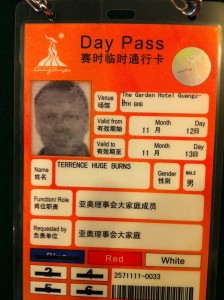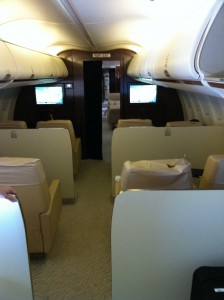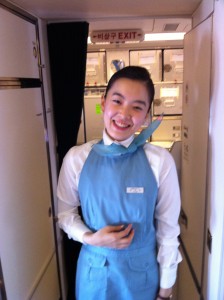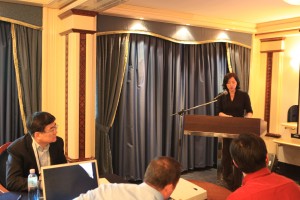
PyeongChang’s 2018 Path to Victory
Part II: April – December 2010
Terrence Burns ©2014
This is part two of four in a series about PyeongChang 2018’s road to winning the 2018 Olympic and Paralympic Winter Games.
After the SportAccord meetings in April, we all had our “marching orders”. The PyeongChang Technical team was busy preparing the initial drafts of the PeyongChang 2018 Candidature Files. Our team was poised to review and edit the drafts for brand messaging consistency to ensure the bid’s new message, “New Horizons”, was reflected as much as possible and where appropriate in the texts.
Our team also began mapping the outlines and strategies for the ten (10) presentations that PyeongChang 2018 (and Munich and Annecy) would be making over the next 16 months. It was a daunting task, but in retrospect, having 10 opportunities to practice our message and presentation skills was a Godsend, as we shall later see. For edification, the ten presentations for the 2018 campaign were as follows:
The 2010 presentations:
- 21 October – 17th Association of National Olympic Committees (ANOC) General Assembly – Acapulco, Mexico
- 13 November – 29th Olympic Council of Asia (OCA) General Assembly – Guangzhou, China
- 26 November – 39th European Olympic Committees General Assembly – Belgrade, Serbia
The 2011 presentations:
- 16-19 February – IOC Evaluation Commission Visit – PyeongChang, Korea
- 23 March – 74th Association Internationale De La Press Sportive Congress (APIS) – Seoul, Korea
- 26 March – Association of Oceania National Olympic Committees (ONOC) – Noumea, New Caledonia
- 7 April – SportAccord – London, England
- 18 May – IOC Technical Presentation – Lausanne, Switzerland
- 28 June – Association of African Olympic Committees (ANOCA) – Lome, Togo
- 6 July – IOC Final Presentation – Durban, South Africa
For each of these presentations, we created a unique communications objective and strategy, given that each presentation had a different target audience and varying message to deliver. This entailed first creating the showflow, meaning:
- Defining how many speakers
- Identifying the speakers
- Defining how many films, helping write film briefs
- Drafting every speech
- Speech training raining every speaker
- Directing a design team on the “speaker support” (Keynote or PowerPoint) in both French and English
- Where applicable, Q&A definitions and practice sessions.
Each presentation took anywhere from four weeks to three months to prepare. It is a lot of work.
My two favorite activities were drafting the speeches and training the speakers. In total, we spent literally hundreds and hundreds of hours writing and re-writing drafts, and training speakers.
For PyeongChang I was insistent that everyone spoke English in his or her presentations. Why? It has nothing to do with language snobbery – it is purely pragmatic. English is the language in which the Olympic Movement does business. Speaking English to an international audience indicates that you and your team will be easy to communicate with – which means easy to work with – and it means less time fumbling with the simultaneous translation headsets during the presentation.
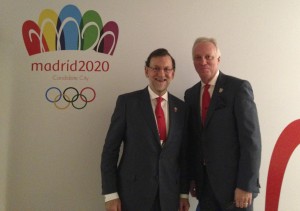
Often, senior officials or politicians simply cannot – or do not wish to – deliver a speech in English. I understand this – as a head of state or senior politician, one does not wish to appear less than perfect.
In this case I have a protocol. If they are the head of state, or a very senior minister, we let them give a (shortened) speech in their own language. Prime Minister Rajoy of Spain is the most recent client of ours (Madrid 2020) who spoke in his native language.
But unless the speaker has ample (and I mean a boatload) time to practice, this is a high-risk solution because we are trying to adapt a speech written in English to another language, and often the prose, syntax, alliteration and emotional flow do not transfer easily – or at all. So generally, I hate doing it. But the usual rule is that most Heads of State get a pass from the audience as long as they are brief; I repeat, as long as they are brief.
Sometimes, we teach the speaker an entire speech in English phonetically. This means the speaker may have no real idea what the words mean, but that he or she has memorized them.
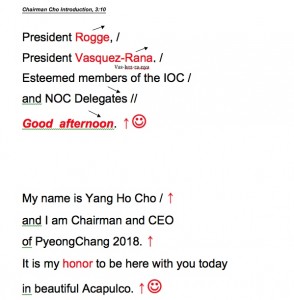 If the speaker understands English well, but has trouble with pronunciation, we adapt the written speech or the teleprompter with various spellings and visual clues as to pronunciation and intonation.
If the speaker understands English well, but has trouble with pronunciation, we adapt the written speech or the teleprompter with various spellings and visual clues as to pronunciation and intonation.
Chairman Cho’s first speech notes (at right) in Acapulco are a good example of this technique; we refined and used it in every presentation and it worked for him, and many others in recent bid presentations.
So, back to PyeongChang.
I felt that PyeongChang had to break out of the stereotype of boring presentations; sorry, there, I said it. And I knew for example, from watching the Tokyo 2016 presentations that it is folly to try to “force” people to be what they are not. But it is also folly to proceed as if it is a (insert major multinational here) board of directors meeting.
For PyeongChang we began with five objectives for the presentations: 1) English language, 2) young speakers, 3) female speakers, 4) emotion and 5) humor, where possible (humor is very tricky in foreign languages). I also knew that with ten presentations, we had to pace ourselves and slowly perfect our messaging and delivery.
We could not peak too soon (as you will read below, after our first presentation in Acapulco, I realized that we were in no danger of peaking too soon). It took us until SportAccord in London in April 2011 to even get close to meeting our presentation objectives. By the Lausanne IOC Technical presentation in May, we were peaking and by Durban in July, we reached our crescendo.
For the 12 October ANOC meeting in Acapulco, we delivered the first set of speeches to the team on August 24th. The standard procedure was for me to send the speeches to the presenters and ask for any written feedback (you learn quickly that only about 10% of the presenters give you written feedback). The bid committee team however, did not like my first round of speeches and made substantive changes, or tried to, throughout. We went back and forth, heatedly, via email and phone calls.
Finally I flew to Seoul to address the issue of who controls the presentation content and speeches. It was typical bid committee meeting; me on one side of a long table and about 15 bid committee members on the other side. Chairman Cho was there (at the head of the table). We began the discussion on who was or was not writing the drafts. There was a lot of frustration – on all sides. I was ready to go home, to be honest.
I am sure they got tired of my refrain “if you want to do what you did twice before you will lose again – be my guest…”. It was tense. Finally Chairman Cho called a break. He and I talked. He gave me advice on how to deal with Koreans, as well as my “style” dealing with them, which he found too aggressive and too blunt; it was a fair assessment. I listened. He listened. We went back in the room and he said to the team, “too many cooks in the kitchen, from now on Terrence writes all the speeches.”
Then, we began an intensive seven to ten days of one-on-one and full rehearsal training sessions, and then we would continue with one-on-one and full rehearsal sessions on-site.
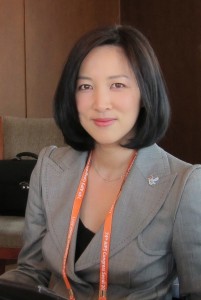
Director
After our first set of practice sessions in Seoul it was clear to everyone in the room that Theresa Rah was going to “carry our water” for the presentations going forward. Theresa, a former television presenter in Korea, grew up in various locales around the world and her English accent was impeccably Canadian-esque.
Her delivery was flawless and she always had excellent feedback and input on her drafts. Moreover, she also worked tirelessly to help other PyeongChang presenters with their presentation skills and English.
Our international relations team utilized Theresa’s skills as well. She was a true team player.
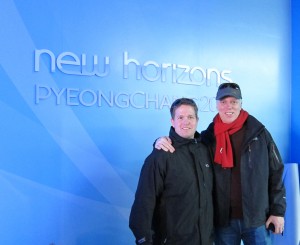
Photo T. Burns
By this time North Design joined us to help with the presentations’ graphics. I have worked with David Woodward (Woody) and his design team on Olympic and World Cup presentations since 2003. Woody knew how to deal with the complexity – and pressure – of live presentations. There are always changes or adjustments to speeches up until the last-minute – which means the accompanying speaker slides must be changed as well, real-time – in two languages. It was a high wire act – Woody and his team handled it flawlessly.
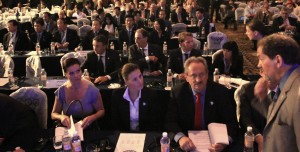
I recall Munich taking the stage with their superstars (and they were superstars) – Thomas Bach, Katarina Witt and Bernard Schwank leading the way. The scripts prepared by my friend, mentor and former business partner George Hirthler, were crisp and on target.
They even had a video of Angela Merkel, the Chancellor of Germany supporting the bid (remember, this was the first presentation to the Olympic Family and they already had the Chancellor of Germany on film…that is called being prepared). They were upbeat and looked fabulous – they seemed happy and confident, and it showed. At that moment, I felt that they were everything that we were not.
Munich 2018 had an incredible technical video that “flew” the viewer through and around the mountain venues, accompanied by a live voice-over by Bernhard onstage. At that point our technical “film” was only maps and still images.
![Mex-1292[3]](http://www.terrencehburnsblog.com/wp-content/uploads/2014/03/Mex-12923-300x225.jpg)
Munich also had a series of creative, atmospheric films capturing the beauty of the city and its people. Reto Lamm, a former snowboarding champion from Switzerland, and the epitome of cool, produced the films. We were still “struggling” with our own films at that stage. I remember having a dry mouth while watching them present. As presenters, they were amazingly good on their first shot out of the gate.
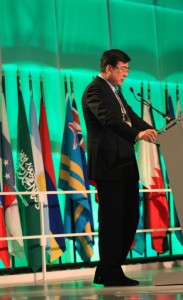
Finally, it was our turn. This first presentation was our “shake out cruise”. It was my opportunity to see how well our “New Horizons” message resonated and judge our speaking team live, in front of an audience.
For that presentation we had Y H Cho, Theresa Rah, Y S Park, Dae-Sung Moon (Korean IOC member and Olympic Champion) and Governor Lee (the new governor of Gangwon Province).
After our first presentation in Acapulco in October 2010, “improbable” was my first impression of our chances having watched Munich’s presentation to ANOC.
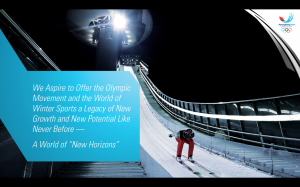
Acapulco is where we first introduced the tagline and theme that would carry us nine long months, thousands of miles and ten presentations around the globe – New Horizons. Here is the slide we used to describe “our vision” to the ANOC audience. The focus was on “new growth and new potential like never before.”
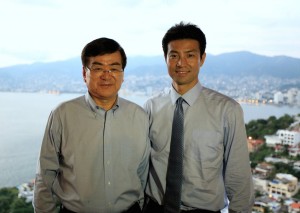
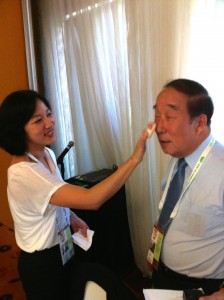
My notes from that day read:
- New Horizons seemed to be the only recognizable “theme” by any city – we need to double down on it and provide new proof points going forward
- Ch. Cho needs a lot of work on his pronunciation and delivery…not used to speaking to an international audience…I gave him too much content
- Theresa – fantastic – will use her more
- Y S Park – has certain charm – used to speaking to the OF (Olympic Family) – can make him funny but I gave him too much content
- DS Moon – looks great, hard to understand – needs a lot more work
- Governor Lee – the new Governor of PyeongChang – not needed again until SportAccord, earliest (he didn’t last long enough in office to joint us in SportAccord)
- Films: more (lots) work to do – MUST HAVE A TECHNICAL FILM
- Speaker slides design – I think Woody’s design looked the best
- Overall, we have a long way to go – NEXT STEPS:
1) Intensive language and presentation training with Chairman Cho and others
2) Produce a new technical film, brief new film company, New Moon, on new films
3) Find young, athlete presenter(s)
3) Increase Theresa’s role in presentations
4) Blow out “New Horizons” because no one else seems to have a clear and concise message

In Acapulco, we had lots of internal drama – politics, factions, consultants leaving (then not leaving), clashing egos and the great battle of two styles of doing business – east and west, hard versus soft, discussions versus decisions, straight-forward versus obtuse…progress or procrastination.
From my perspective, here is the single most important thing to know in an Olympic bid: it has a beginning and an end; meaning, every single day matters.
That is it.
If a bid vacillates on making decisions, then it is sitting still; and if it is sitting still then it is either sinking to the bottom or falling behind.
This may sound dramatic or crazy, but I think no other “Olympic activity” comes as close to what the athletes on the field of play experience as does bidding for the Olympic Games for the bid committee team. It is high drama with no second chances. There is a start and a stop. Each competitor brings his or her own strengths and weaknesses. The “players” endure tremendous personal and professional pressure (how would you like to give a speech in front of the entire world in a foreign language?). It is pure competition and by the way, there is only one medal – gold.
After the presentations we had our debrief meeting. At these meetings all of the PyeongChang team would show up – many of whom I had never seen. One of the “critiques” I shared with PyeongChang 2018 about their previous bids was that Korean bids always brought too many people who seemed to do nothing but stand around in groups (amongst themselves) and not mingle with anyone else. At this point, PyeongChang 2018 seemed to be carrying on the tradition, as a phalanx of expectant faces looked at our team for answers.
I led off the meeting with my critique of our performance – I held nothing back and luckily all of the other external advisors agreed. Like me, everyone recognized the high quality of Munich 2018’s presentation.
There is always “that moment” in a bid campaign, when hope must triumph over fear.
This was that moment for PyeongChang 2018.
The team was quiet. They were confused and close to being dispirited. It was up to us external advisors in the room to address the situation honestly, but also in a way that provided a path forward. Following a summation of the points from my notes and others on how and where we needed to improve, I felt I needed a closing that would help them understand that all was not lost; in fact, we’d only just begun. We had all the ingredients of a great bid. Here is what I said, to the best of my memory:
“Munich 2018 just gave the best presentation that they will ever give in this campaign. It was brilliantly done, it was tremendous…but I believe that they will never give another one that good again. I don’t think they have a message yet that compares to “New Horizons”, and honestly they were so good today that I don’t know how they can top it. On the other hand, I believe that our team will only get better and better, and we will give our best presentation on the stage in Durban next July.”
I don’t know how many people in the room believed me, but I believed it. I just hoped that it was true.
Our next presentation took place on 13 November, to the Olympic Councils of Asia in Guangzhou, China. The presentation time was shorter, so we only had three speakers – Y H Cho, Theresa Rah and Y S Park – and one film.
The team was much more comfortable being in Asia, and I think that helped them onstage. I know one thing that made them relax, and that was a city full of Chinese food. Wherever we went in the world, no matter what city or cuisine, the PyeongChang team always found the local Chinese restaurant for our first or second meal.
Two of the more exciting moments in Guangzhou were 1) the Chinese apparently changed my middle name from “Hugh” to “Huge”, and 2) I worked up the nerve to ask Katarina Witt to have her photo taken with me.
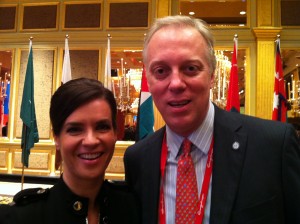
Throughout the 2018 campaign, PyeongChang was fortunate to always be the last to present – this was good for a whole host of reasons. Very often bids are at the mercy of the technical abilities – or lack thereof – of the venue team that is managing technology.
In Guangzhou, both Munich and Annecy had technical problems in their presentations, which were fortunately solved by the time PyeongChang took the stage. Our team’s presentation was tighter in Guangzhou, but we still lacked any emotional cohesion with each other onstage. I thought we made improvement from Acapulco, but we still had issues with everyone’s (except Theresa’s) English delivery and pronunciation. We had to work harder; the good news was that Koreans work very hard.
The last presentation of 2010 was to the EOC in Belgrade, just 13 days after Guangzhou. A “perk” on this trip was that a few of us were able to hitch a ride from Seoul to Belgrade with Chairman Cho on his own plane from the Korean Air Boeing Business Jet fleet. It was a beautiful plane with four bedrooms, eight luxurious seats and a couch.
I dubbed the plane “Elvis-1” because someone asked me “how did you like flying on Chairman Cho’s plane?” I said, “I feel like Elvis.” So, it stuck. We had our own Korean Air attendant and the food and the wine were exquisite. It sure beat standing in line at the airport.
Given both Munich and Annecy were from European NOCs, we felt as if we were going into the proverbial “Lion’s Den”. I felt that this presentation, on European soil, would be tremendously important for our bid, but perhaps that is also how they felt in Guangzhou. I put a lot of pressure on the presentation team and in retrospect, maybe too much for some.
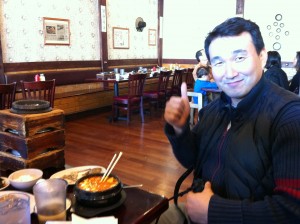
We were still experimenting with the speaker line up, e.g., who would open, and who would close.
For Belgrade we decided on the following order: begin with Chairman Cho again as the opener but with less content followed by a film, then Theresa, then Korean Olympian Kwang-Bae Kang, then Y S Park and close with a another film.
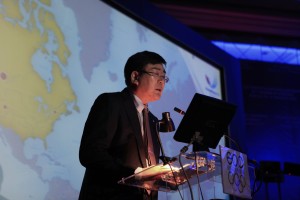
One incredibly valuable new asset in Belgrade was the use of teleprompters. Other team members had suggested it for earlier presentations, and I resisted. That was a mistake and I should have realized it earlier. Now we were using a teleprompter (as were both Munich and Annecy) and it helped all of the speakers a great deal.
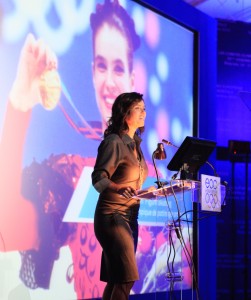
Belgrade taught us a few more things. After the presentation, we were told by many of the Olympic media in the room that “PyeongChang wins on the words and the message…Munich wins on style and video…”. I appreciated the compliment, but I knew that words and message were only half the battle. In a forty-five minute presentation in a giant room, (as in Durban) style points will matter, I thought.
We simply had to get better at presenting. Both Theresa and Kwang-bae were very well received as speakers – young, enthusiastic and easy to understand; there was a lesson in that.
Our post-presentation meeting the next morning was not an easy one. We had a lot of ground to cover with little time.
I was departing Belgrade that morning on my way to Zürich to meet our team and prepare our other bid client, the Russia 2018 FIFA World Cup Bid, for their Final Presentation to FIFA on 2 December, but that’s another story. I was working hard to keep the two different bid’s films and speeches straight in my mind.
![Beograd-1193[7]](http://www.terrencehburnsblog.com/wp-content/uploads/2014/03/Beograd-11937-300x168.jpg)
After the Belgrade re-cap meeting, I had one of the most extraordinary conversations I’ve ever had with a bid client. Chairman Cho cleared the room to speak to me alone. This is the gist of the conversation.
Chairman Cho: “I know I did not do well yesterday…”
Me: “No, you didn’t and it may have cost us a couple of votes…what happened…you were good in rehearsal…”
Chairman Cho: “I got nervous. Even though I am fluent, presenting in English is still very difficult. Listen – I do not need to speak. In fact if I am not good enough, please tell me. I don’t need the recognition – I am a busy, successful person. I am doing this bid because the president of my country asked me to, and he said to me “we cannot lose again”. I want us to win too, but I will NOT be a reason that we lose. If you want me to just sit on the stage and smile, I will be happy to do so…”
I was taken aback.
In most bids there is no small amount of infighting amongst the bid leadership as to who gets the most “air time” during a presentation. Some people even keep track of the length of other speakers’ speeches – really. I have even felt that some bid leaders were more interested in their own personal agenda than the bid’s. That is why this conversation was so refreshing – and invigorating. Chairman Cho meant it. He had no ego in this – he simply wanted to win for his country.
Whatever differences Chairman Cho and I had up until then, and there were a few, simply vanished in my mind. I really respected what he said. I committed to him, and to myself, to help him work harder. And he did work harder – he was tireless. Once, he called me at home and asked if I had seen the new film” The King’s Speech”. I said “yes”. He said, “good…that’s you and me” and then he hung up. Y H didn’t waste words.
We hired a London-based English language elocution firm to assist, but in the end it was simply Chairman Cho and I, or even more so, Chairman Cho and Theresa Rah practicing hours on end to improve his English pronunciation and presentation skills. The progress he made from Acapulco to Durban was extraordinary. When someone wants to succeed that badly, it is an inspiration to everyone else on the team.
 2010 was drawing to a close and we set our sights on what we had to accomplish in 2011.
2010 was drawing to a close and we set our sights on what we had to accomplish in 2011.
After three presentations in 2010, we knew we had a strong central message that so far, no other bid was able to counter effectively.
“New Horizons” was turning out to be something powerful and differentiating, but we still had not been able to communicate it fully, yet. We would, in time.
We knew our strengths and weaknesses. And most importantly, the intangible feeling of settling into a real “team” was beginning to take place. Often it takes the “heat of battle” to draw people together, to get them to assemble and follow one true banner of leadership and direction.
We had been humbled; yet thanks to the unique Korean culture, we persevered with great patience. That culture, and working with our Korean colleagues for almost two years, proved a powerful lesson for me, personally.
As we prepared for the last year of the campaign, it was evident that we were well on our way to being “competitive” in the race. And for the first time we were gaining a little momentum – and more importantly, confidence.
But I still did not know if we could really win; that would not come until later.
Next: Presentation Overdrive
Special thanks to Stratos Safioleas for use of his photos and review/edit/memory help. Stratos served PyeongChang 2014 and 2018 as their external International Media and Social Media Advisor.
Special thanks as well to Theresa Rah, for her review/edit/memory help.
